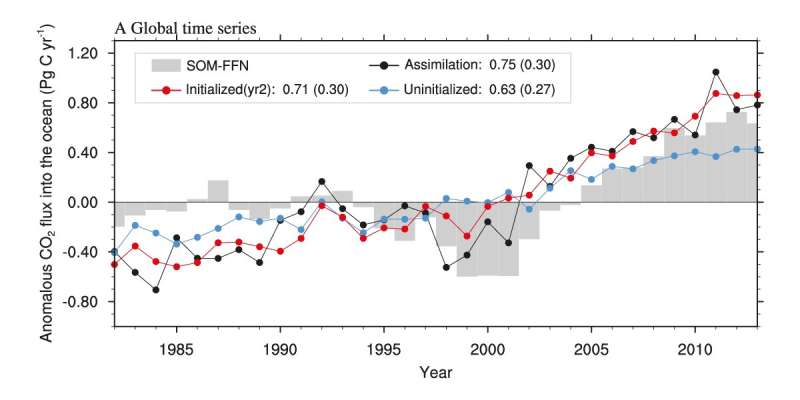Predicting tvariable carbon dioxide uptake by the ocean

Ocean CO2 uptake is predictable for two years in advance, according to new paper in Science Advances by Dr. Hongmei Li, Dr. Tatiana Ilyina, Dr. Wolfgang A. Müller, and Dr. Peter Landschützer, all scientists in the department "The Ocean in the Earth System" at the Max Planck Institute for Meteorology (MPI-M).
As revealed by observation-based studies, the ocean carbon sink showed strong variations in the last three decades that are attributable to climate variability. Dr. Hongmei Li says: "Yet as of now, Earth system models (ESMs) fail to capture these strong vacillations. This raises much concern, since the strength of the ocean carbon sink together with the land carbon sink determines the fraction of anthropogenic emissions remaining in the atmosphere, and hence modulates climate change."
Dr. Wolfgang A. Müller shares his expertise on the decadal predictions of the physical world: "ESM-based predictions initialized by observations have proven as skillful in predicting variability of some ocean variables such as sea surface temperature or Atlantic meridional overturning circulation." This leads to an extension of predictions to the Earth system: Can such decadal prediction systems also reproduce observed variations of the ocean carbon sink and predict them? If yes, what drives the predictive skill?
Scientists in the ocean department address these questions by using the new decadal prediction system based on the Max Planck Institute ESM, i.e., MPI-ESM. They reproduce the observed variations of the global ocean carbon sink by assimilating atmospheric and oceanic observations into the MPI-ESM. They further find that the variations of the global ocean carbon sink are predictable up to two years in advance when comparing to data-based estimates, and the potential predictive skill is up to 3 years by comparing to a data assimilation. For the first time they demonstrate that temperature variations largely determine shorter-term (< 3 years) predictability, and the non-thermal drivers of the ocean carbon sink, i.e. circulation and biology, are responsible for longer-term (> 3 years) predictability, particularly at high latitudes.
Dr. Peter Landschützer says: "This study is a great example of how we can combine observation-based estimates with models to enhance our understanding about the global carbon cycle and its future prediction." Dr. Tatiana Ilyina adds: "Our predictions of ocean carbon sink show large potential for monitoring and predicting the near-term fate of anthropogenic CO2 and provide policy-relevant analysis for the UNFCCC global stocktakes."
More information: H. Li et al. Predicting the variable ocean carbon sink, Science Advances (2019). DOI: 10.1126/sciadv.aav6471 H. Li et al. Predicting the variable ocean carbon sink, Science Advances (2019). DOI: 10.1126/sciadv.aav6471
Journal information: Science Advances
Provided by Max Planck Society

















